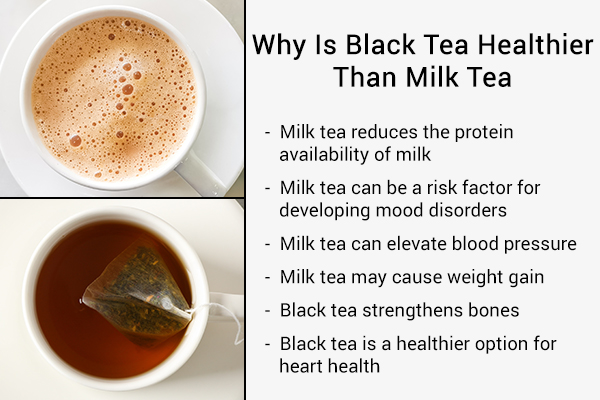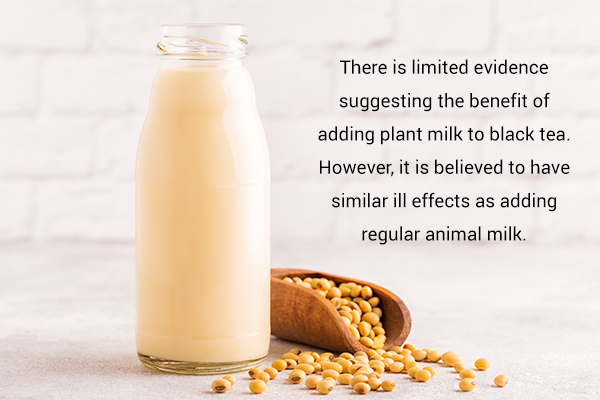In this article:
The available research studies all seem to point out black tea being a healthier alternative to black tea with milk.

Tea is a popular beverage consumed all over the world. Black tea is obtained from the fermentation of the leaves of Camellia sinensis. The leaves are then brewed in hot water to release their signature note and color.
Rich in polyphenols, tea is considered a medicinal beverage as it can provide health benefits that are useful in the management of common health conditions such as high blood pressure, weight gain, and high cholesterol and blood sugar levels. (1)
Though traditional tea is made simply by brewing black tea leaves in water, recently the addition of milk – be it animal milk or plant milk – has become increasingly popular.
Unfortunately, many studies have found evidence that the addition of milk significantly reduces the antioxidant activity of tea, which in turn affects the health benefits it offers. (2)
It is believed that the catechins in black tea interact with the proteins in milk, resulting in a reduced digestibility of proteins and also making the catechins unavailable. (3)
Why Is Black Tea Healthier Than Milk Tea?
Here are some of the science-backed reasons black tea is healthier than milk tea.
1. Milk tea reduces the protein availability of milk
Milk is an important source of protein. However, adding milk to black tea can negate this benefit.
The catechins in black tea bind to both the milk protein and digestive enzymes, resulting in the poor absorption of the protein in milk. Though the catechin availability in black tea increases, it does not merit adding milk to black tea. (3)
2. Milk tea can be a risk factor for developing mood disorders
Black tea is rich in antioxidants and polyphenols. It also contains some amount of caffeine, which can positively alter mood by decreasing the risk of depression.
One study suggests that drinking up to 4 cups of black tea each day can help protect against depression. (4) However, the addition of milk seems to have the opposite effect.
A recent study found that regular consumption of bubble tea – a popular beverage made by brewing tea and adding milk along with other ingredients – is a major risk factor for developing mood disorders such as anxiety and depression in Chinese young adults. (5)

3. Milk tea can elevate blood pressure
The polyphenols in black tea are very effective in reducing blood pressure. Evidence suggests drinking black tea can reduce systolic blood pressure by 3.2 mmHg and diastolic blood pressure by 2.6 mmHg. (6)
Another study also found that plain black tea was more effective than black tea with milk in increasing the dilation of blood vessels, which is beneficial in reducing blood pressure. Black tea with milk also increased blood pressure in the study participants. (7)
4. Milk tea may cause weight gain
Black tea is generally consumed plain either with minimal sugar or no sugar at all.
Milk tea, on the other hand, is often consumed in various drink forms: iced tea, bubble tea, masala chai, chai latte, etc. All these forms not only contain milk but also contain high amounts of sugar, which can increase the risk of obesity. (8)
ALSO READ: 9 Best Teas That Help You Lose Weight
5. Black tea strengthens bones
Population studies have revealed an interesting trend relating to the consumption of black tea and bone health. The elderly who drink green tea and black tea without milk on a regular basis had stronger bones, less risk of developing osteoporosis, and increased formation of new bone cells.
Animal studies have found caffeine from black tea to increase bone mineral density as well. (9)
Reports have also emerged suggesting the consumption of black tea (1–4 cups daily) to reduce the risk of osteoporosis and fractures. (10)
6. Black tea is a healthier option for heart health
The antioxidant ability of black tea is useful in reducing illness and death associated with heart diseases. Studies have found black tea antioxidants to reduce cholesterol levels in patients with high cholesterol levels. (11)
More recent studies have found that drinking no more than 4–6 cups of black tea will reduce the risk of coronary artery disease that is caused by the deposition of fat in the inner wall of blood vessels. (12)
The study also highlighted the need to restrict tea intake as a very high level of black tea consumption (more than 4–6 cups) can worsen this risk. (12)
Can I Add Soy Milk to Tea Instead?

There is limited evidence suggesting the benefit of adding plant milk to black tea. However, it is believed to have similar ill effects as adding regular animal milk. (2)
Practical Takeaway
- Black tea is rich in flavonoids and polyphenols that have health-benefiting properties.
- Adding milk to black tea allows the binding of protein (in milk) and catechins (in tea), reducing the health benefits of both ingredients.
- Studies have found adding milk to black tea reduces its benefits on blood pressure and mood disorders and increases the risk of weight gain.
- Black tea without milk improves bone density and reduces the risk of fractures in people who regularly consume it.
- Black tea drinkers have a reduced risk of dying from illnesses due to heart disease.
- Was this article helpful?
- YES, THANKS!NOT REALLY


